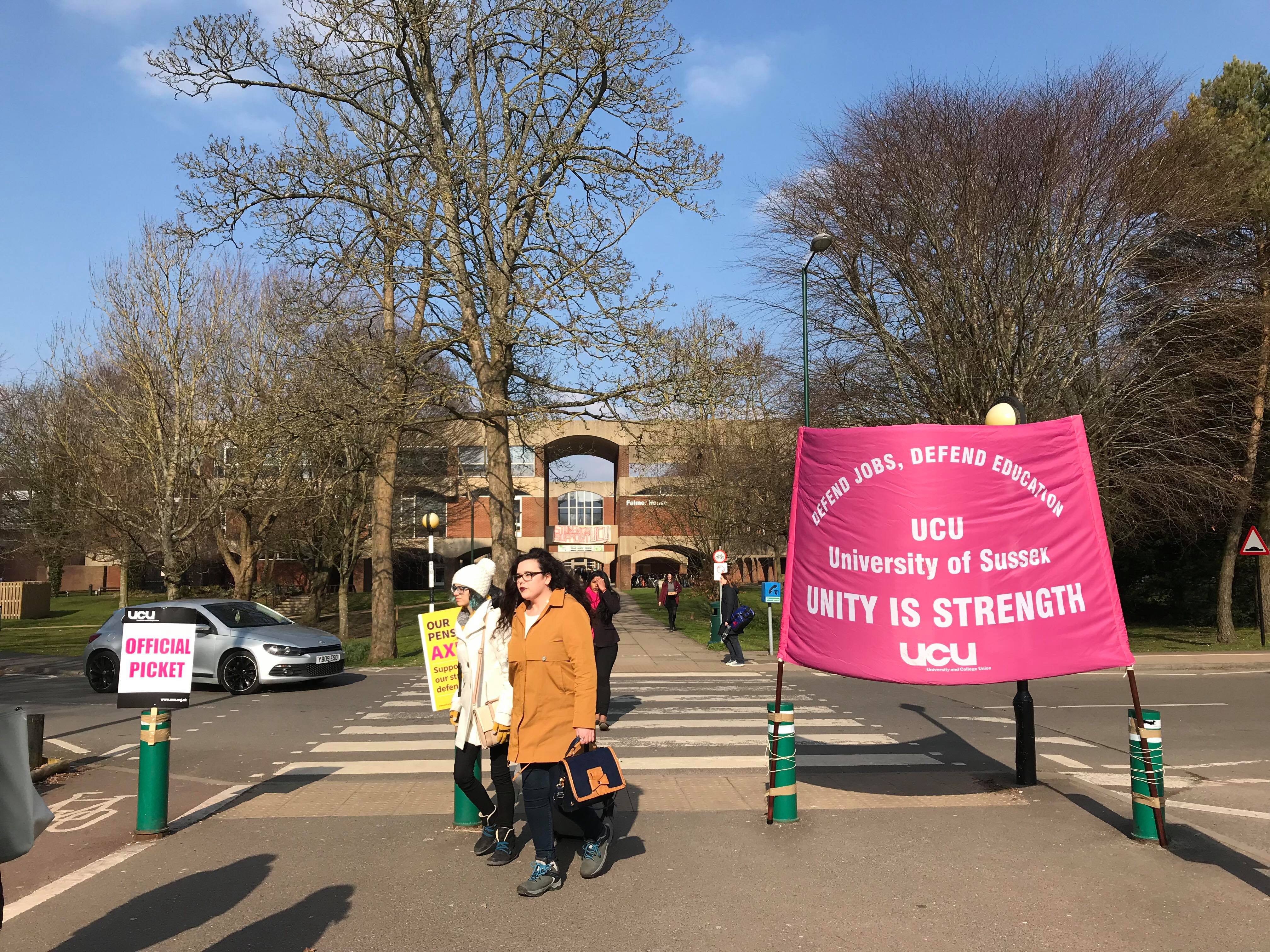A recent report has described universities as “anxiety machines”, and cites many of the disputes raised by UCU, such as excessive workloads and precarious contracts, as contributors to the spike in poor mental health.
TW: Suicide
On February 3, UCU (University and College Union) announced that another wave of strike action would hit 74 UK universities, spanning 14 days. Much of the conversation surrounding the announcement has been centred around the impact it will have on students, and with approximately 1.2 million students being affected, it is not hard to understand why. Some students have responded to the announcement by demanding a partial refund of tuition fees, citing lost teaching-time and being unable to contact lecturers via email during the strike period as a valid reason for financial recompense. A student at Royal Holloway, University of London created a petition which garnered over 2,000 signatures, demanding a refund of £1,000 to every student affected by the strikes. While a lot of sympathy surrounding the strike action has been directed towards students, this narrative has arguably diverted attention away from the root causes of the strike action.
UCU have cited an array of ongoing disputes as their reason for resorting to strike action, the most notable being falling pay, the gender and race pay gaps, unsafe workloads, and threats to pensions. Their announcement states: “Since 2009, pay has been effectively cut by nearly 20% in real terms, while staff are being asked to work harder and longer than ever before. The employers’ own analysis highlights that women and black and minority ethnic staff experience significant pay discrimination. Casual contracts remain entrenched. Yet the university employers are refusing to commit themselves to meaningful action on any of these appalling conditions”. With regards to pensions, they have claimed that “the typical USS member will be around £240,000 worse off in retirement compared to 2011 thanks to the changes made to staff’s benefits.” There has also been a significant focus on the issue of casualisation, which refers generally to the increase of zero-hour and fixed-term contracts.
The UCU disputes have been largely conflated into an argument over pay and pensions alone, which has caused many to (perhaps inadvertently) turn a blind-eye to the devastating consequences of the stressful working conditions which thousands of Higher Education staff suffer on a daily basis. A Higher Education Policy Institute (HEPI) report, published in 2019, claims that there is now an “epidemic” of poor mental health among Higher Education staff. The report, authored by now-independent scholar Liz Morrish, delved into data obtained from 59 higher education institutions from across the UK, and identified a significant escalation of poor mental health among university staff in the period 2009-2016.
The report found that between 2009 and 2015, counselling referrals rose by an average of 77%, while referrals to occupational health services rose by 64% during the same period. To put this into a more generalised perspective, the report identified an overall increase in demand for counselling services of 293% across the six year period. While we cannot speculate about individual reasons for accessing counselling services, the report looked at various factors which may have contributed to this sharp spike, many of which have also been raised in the UCU disputes. The following factors were identified as significantly contributors to the spike in poor mental health among university staff:
- Excessive workloads and workload models which frequently under-count time necessary for fulfilling tasks
- Audit and metrics dominate the working lives of academics
- Many academics exist on a succession of precarious contracts which do not allow for career planning or advancement.
- Performance management in universities is linked to short-term outcomes and expectations which are often unattainable for many.
The Badger approached Liz Morrish to discuss her motivation for writing the HEPI report, and her personal experience with the working conditions which have culminated in the nation-wide strike action. She again cited increased workloads, increased performance surveillance, and the decline of full time lectureships as significant factors which “weighed heavily on the mental health of academics” – all of which drove her decision to write the report. The root cause of her motivation, however, was spurred by the tragic deaths by suicide of two academics: “Cardiff University lecturer, Malcolm Anderson, took his life on campus when, after years of appeals to his manager, his workload had escalated out of control. Another death by suicide was triggered by pressures to meet targets for research funding. Professor Stefan Grimm at Imperial College, London, had been rebuked by his manager over this issue.”
Following these deaths, Liz felt a duty to speak to students about the pressures their lecturers were really under. After speaking to the students of a colleague who had fallen ill with work-related stress, a conversation which was inherently critical of university management, Liz said that it became clear she could not discuss the issue of academics and mental health whilst still remaining employed: “…being critical of management, even though this was a sector-wide problem, was not going to be tolerated by the management of my institution. It was clear that if I wanted to maintain my academic freedom, I was going to have to resign my academic post and continue my work as an independent scholar. And so that’s what I did […] I have the freedom to write without fear of victimisation now.”
The inability to speak out against university management for fear of retaliation is indicative of the toxic environment which has been created within Higher Education. Despite university management being at the heart of the issue, there is a strong feeling among university staff that speaking out against management will lead to some form of retaliation from senior staff. The Badger approached a large amount of university staff from various institutions from across the UK, and many of them were unable or unwilling to speak to us without the protection of anonymity. Nonetheless, their testimonies attest to the stressful and anxiety-inducing conditions which were highlighted in Liz’ report.
One lecturer, who asked to remain anonymous, spoke about the physical and emotional consequences of these ever-increasing workloads:
“I’m on strike because I don’t think I will physically or mentally be able to keep working if workload conditions don’t improve. In between July and November, I lost 15lbs that I didn’t have to lose because I forget to eat when I’m under pressure. Over the summer and autumn, I would get to work, go cry in the bathroom, and then get on with the rest of my day. At the end of October, I got the first wave of a continuous chest infection that I kept thinking was gone but that came back the day after the autumn teaching term ended, lasted over the entire holiday break, and then came back again on the Monday of the first week of the spring teaching term […] I love my job but I’m quite worried that I just physically won’t be able to keep going.”
Another lecturer, who also asked to remain anonymous, spoke to us about the severe financial strain of precarious employment:
“Funding for my PhD ended in 2005 and I did not obtain a full time permanent contract until 2013. In those eight years, I only earned enough to pay income tax twice and only had one contract, for nine months, that was not hourly paid. Even now, and even though I know I am well paid under my current contract, I struggle to undertake basic financial tasks for fear of looking at my bank balance […] I have no assets behind me and therefore despite being well paid could not possibly leave the sector despite how horrendous it has become. ”
A third anonymous lecturer told The Badger about their personal experiences with the lack of balance between work and a personal life, which led to a mental health crisis:
“One of the things about managing your mental health is realising that you need help. That moment of realisation came when I looked in the mirror one day and didn’t recognise the woman staring back at me. My workload consists of potentially teaching all year round. This means that staff in my position are given nearly double the teaching load compared to our counterpart in other Schools. Often I continue teaching when the rest of the university stops.”
They emphasised the unfair situation many university staff find themselves in, with the pressure to meet targets continuing “despite repeated attempts to negotiate better working conditions.”
They said, “Over the years I’ve become less motivated to put more effort into my work because quantity, not quality, is emphasised,” and “this way of working has chipped away at my mental health.”, “I sought help from the NHS because the university does not provide appropriate mental health support for staff. The help I received was a lifeline, but ultimately temporary because the problem of my working conditions has yet to be addressed.”
Malcom James, Senior Lecturer in Media and Cultural Studies at the University of Sussex, spoke about the poor treatment and exploitation of staff in UK universities. He said:
“The neoliberal university is a place where the care for staff and students is secondary to profit and attainment in various spurious metrics. That has led to a situation in which staff are exploited, and where precarity is a central means through which the university governs. … It is now not uncommon for early career staff to be working in multiple institutions on hourly paid contracts, whilst caring for family and trying to publish ‘high ranking articles’, at the same time these same people often experience poor interpersonal treatment by staff senior to them, who indeed also feel bullied by the institutions they work in.”
Umberto Albarella, Professor of Zooarchaeology, University of Sheffield, spoke to The Badger about the tragic death by suicide of Stefan Grimm:
“Stefan Grimm committed suicide in 2014. It is not unreasonable to consider him a direct victim of ‘university metrics’. Stefan was put under immense pressure, which affected his mental well-being and led to his tragic gesture. […] Almost all policy discussions in the university are driven by financial profit – students are valued as long as they pay fees, and staff as long as they bring students (with their fees) or research grants.”
He went on to discuss the commodification of higher education, stating: “We are encouraged to consider students as customers and colleagues as competitors. This is not just ethically wrong but also leads to extremely inefficient management of the university. Staff are prone to become disillusioned and massively overworked, students are insufficiently cared for and morale is generally low.”
Until last week, there had been a deafening silence from university management across the country regarding the very real consequences of increasing workloads, falling pay, and most pressingly – casualisation. However, on 3 March, leaked minutes from a Russell Group meeting revealed that the group had issued a warning over the “reputational damage” which has occurred because of conversations surrounding the impacts of casualisation. The report said, “University staff and other stakeholders, such as funders and politicians are increasingly expressing concerns around the ‘casualisation’ of teaching and research contracts and a perceived lack of support for careers progression… Russell Group universities need to show leadership in this debate, both as part of their duties as responsible employers and in order to avoid further reputational damage”.
UCU General Secretary Jo Grady responded: “Sadly, it looks like it is fear of reputational damage, rather than concern for staff or students, that has prompted universities to act on casualisation.”
The report goes on to state: “The working conditions for staff are the learning conditions for students. staff who have poor mental health, insecure contracts, and heavy workloads can negatively affect student experience and outcomes”. It also goes on to claim that the consequences of casualisation “…can disproportionately affect those from less advantaged backgrounds, as well as immigrants, for instance – those who require a Tier 2 visa to maintain residency.”
What is more, the report explicitly references Liz Morrish’s report and therefore acknowledges that there is an epidemic of poor mental health among higher education staff. However, the report states: “…there is little public information in the public domain explaining the need for different contract types and where and how often they are used. Within this vacuum, there is a risk that university critics could be left to shape this agenda, as well as the ‘solutions’ to it.” It also revealed that at Russell Group universities there has been a 127% increase in the number of part-time, fixed term teaching only roles since 2012/13.
The Badger approached the University of Sussex about the issues raised in this article. We asked the following questions:
- Can you explain the sharp increase in referrals to counselling at the University of Sussex from 2015-2016, where there was a 13x increase in referrals?
- What measures are put in place to protect staff’s wellbeing from the effects of casualisation?
- Do you acknowledge that the factors laid out in the HEIP 2019 report, such as excessive workloads, audits and metrics, and precarious contracts have contributed to an epidemic of poor mental health among Higher Education staff, and if so, what has the University of Sussex done to prevent this?
The University provided the following comment regarding the issues raised above:
“We recognise that, for many reasons, most people need help in managing their mental health at some point in their lives and we welcome the fact that accessing support has become easier and less stigmatised in recent years. We are committed to supporting the wellbeing of our staff both within and outside of the workplace.
Through our partner CareFirst, any member of staff at Sussex can access free, confidential support, any time of the day and night. Whether it is a family matter, moving house, moving job, a major life event, neighbourhood concerns or consumer rights, CareFirst can provide advice and help, and signpost colleagues to more specialist services. If CareFirst experts believe that face-to-face counselling would help, this is made available locally.”
In light of the revelation that Sussex decided to outsource their well-being services in October 2018, The Badger sought more answers from the University regarding their partnership with Carefirst. However, they failed to provide a response before our deadline. We hope to write a follow up article about outsourced well-being services in the future.
The UCU strikes came to an end on March 13. Sussex UCU have shared leaflets stating that “Negotiations have been positive. There has been some movement from employers that hasn’t been witnessed before”. The Badger will update this article with the conclusions of this wave of strike action.
You can read Liz Morrish’s report, “Pressure Vessels: The Epidemic of Poor Mental Health Among Higher Education Staff”, here.
Testimonies from Liz Morrish and university staff have been shortened for the purposes of this article. You can read their full testimonies here.
[Image Credit: Liz Morrish and HEPI]





